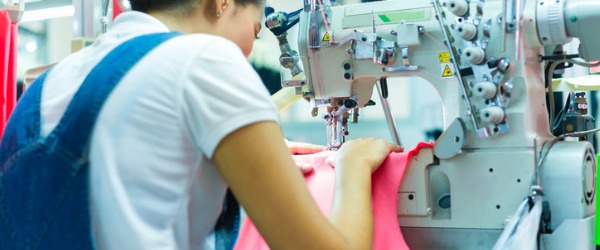What is a Sewing Machine Operator?
A sewing machine operator is a textile worker who sews fabric with an electronic sewing machine. Although many couture houses employ hand sewers to do delicate beading and embroidery, most clothing manufacturers also keep a legion of sewing machine operators on their payroll because using the machine speeds things up dramatically.
Some sewing machine operators do their work on machines identical or similar to those commonly used in domestic sewing projects; others use larger, more powerful machines that are faster and able to handle thicker fabrics easily.
What does a Sewing Machine Operator do?

Sewing machine operators operate, inspect, and repair sewing machines. A sewing machine operator threads the machine (this is a very intricate process on many machine models), adjusts the tension settings based on the type of thread being used, selects stitch settings and then gets down to sewing. Sewing machine operators must monitor their machines for symptoms of metal fatigue or motor failure, and may have to perform minor repairs on the spot. Even experienced operators occasionally make mistakes; one of the most difficult aspects of work as a sewing machine operator is catching and fixing any mistakes made.
Sewing machine operators must understand the limits of their machine. All sewing machines are not created equal; those with weaker motors cannot accommodate heavy fabrics such as denim and canvas and may break if the operator tries to force the fabric through. Needle selection is also relevant here; thicker fabrics require longer, thicker needles because they are stronger and less likely to bend or break. If the proper needle gauge and type of sewing machine are not available, the operator may have to hand-stitch the heaviest fabrics. This is time consuming, but prevents broken equipment and the injuries that may result from flying needle parts.
Sewing machine operator's duties (depending on type of job):
- Assemble pieces of garments by matching patterns and dye lots
- Operate single, double or multi-needle serging, flat bed felling, banding and other sewing machines, to join sections of garments or other articles into finished products on a piece-work or production basis
- Operate fur sewing machines to join fur pelt strips to required size and shape and join pelts into garment sections or shells
- Operate stitching machines to sew leather parts together for leather garments, handbags, shoes and other leather articles
- Operate serging machines to sew and overcast edges of material simultaneously
- Operate tackers, pocketsetters, buttonhole makers and fusing, hemmer and other machines to perform various operations in the fabrication of garments and other articles
- Examine garments and operate sewing machines, sergers and other machines to repair garments and other articles during the manufacturing process
- Complete production reports
- May perform minor maintenance and repairs on sewing machine
What is the workplace of a Sewing Machine Operator like?
Most sewing machine operators work in the garment industry, although tough industrial sewing machines are also used to make boat sails, curtains, fabric napkins and upholstery. Sewing machine operators may also work for sewing machine manufacturers. Their experience "out in the trenches" is invaluable for companies that are developing new sewing machine models because the operators know what works, what doesn't and what they'd change if they could.
Those who specialize in altering wedding gowns often do their work in a small, cramped room in the rear of a bridal salon; others offer a broader range of alteration services and handle clothing for both women and men. Sewing machine operators who work for large clothing manufacturers often work in a huge warehouse environment, where the focus is on churning out garments as quickly as possible.
If a sewing machine operator prefers creating and altering theatrical costumes, he or she can expect to set up shop in a long string of temporary locations. These operators must often bring their own sewing machine with them, and are given work space in the basement of a theatre or opera house. In this type of environment, the sewing machine operator must be able to think quickly, block out distractions and work under extremely short deadlines. Some sewing machine operators specialize in costumes for dancers and figure skaters; athletic costumes must be durable, comfortable, have an attractive appearance, and must also not interfere with the athlete's movements.
Sewing Machine Operators are also known as:
Textile Worker